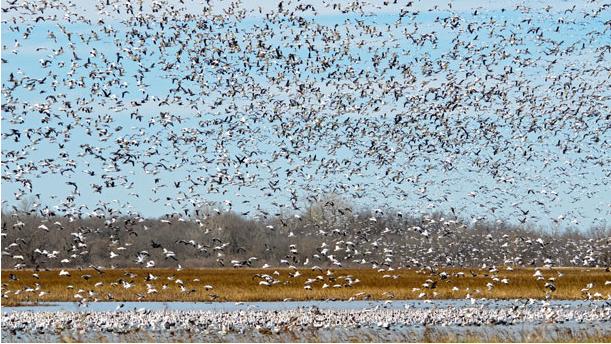New Interior ruling threatens to undo protections of migratory birds
Snow geese migration.
Seventeen former Department of Interior officials from both Republican and Democratic administrations have written a letter protesting a new DOI ruling that exempts industry from punishment for causing negligent deaths of birds. The ruling may also violate the century-old Migratory Bird Treaty with Canada and other nations.
Paul Schmidt, a former Fish and Wildlife official who served administrations from President Jimmy Carter through President Barack Obama, organized the group letter. “The original purpose [of the agreement] was to establish a continental approach to managing and conserving migratory birds,” Schmidt explains. “It began with a treaty with Canada in 1916, when folks realized that migratory birds don't recognize political boundaries and that there needed to be cooperation throughout the lifecycle of a migratory bird in order for there to be good management of that population.”
The Migratory Bird Treaty Act (MBTA) focused mainly on the hunting and killing of birds for their feathers and other trophies, but in modern times it has been used in different ways. During the Exxon Valdez incident in 1989 and the explosion of the Deepwater Horizon offshore drilling rig in 2010, each of which killed thousands of birds, the MBTA was used in a punitive manner to fine the companies and contractors associated with the disaster.
The oil companies didn’t much like this interpretation of the law. Now they have found an ally in Interior Secretary Ryan Zinke and have successfully pushed to narrow the interpretation. Schmidt and his allies are pushing back.
“The 17 signatories to our letter, [going] back to the Nixon administration, are objecting to this narrow view, in which someone is violating the law only if they intentionally and purposefully killed or took that bird,” he explains. Zinke’s interpretation, Schmidt says, would no longer allow the act to be used as a tool in conservation, as it has been for decades, to help prevent such things as oil spills, mass electrocutions on electric wires and power lines, or deaths in wind turbines and oil pits.
Oil pits are, in fact, a good example of how the MBTA was used successfully to protect birds. The process of developing oil and bringing it to the surface creates waste pits, which become an attraction to birds flying overhead, Schmidt explains. The birds obviously can’t recognize that the pit contains toxic material; they see a watering hole and fly down to it. Then they die from chemical exposure.
“It was recognized that this was a fairly significant problem, particularly in some parts of the [American] West 20 years ago,” Schmidt says. “So, technologies were developed whereby you put a netting over that oil in order to keep the birds from committing suicide, if you will, inside an oil pit.”
Schmidt notes that the MBTA has no civil suit provision that allows citizens to bring a case against the government for not enforcing the law, unlike the Endangered Species Act, which does have a provision that allows organizations or individuals to take issue through the courts.
Canada, Mexico or other nations who are parties to the Migratory Bird Treaty might have standing to bring a complaint, however. “I understand that the Canadians are considering exchanging a diplomatic note with the United States expressing their concerns,” Schmidt says. “It was just a few years ago, when I was serving in the US Fish and Wildlife Service, that we exchanged diplomatic notes relative to the Migratory Bird Treaty with Canada affirming both countries’ interpretation.”
“It’s ironic,” he concludes, “that now Canada would have to come back to us and express concern or objection for a brand new interpretation that violates that diplomatic note, which was exchanged between our State Department and the Foreign Affairs Office in Canada.”
This article is based on an interview that aired on PRI’s Living on Earth with Steve Curwood.
Our coverage reaches millions each week, but only a small fraction of listeners contribute to sustain our program. We still need 224 more people to donate $100 or $10/monthly to unlock our $67,000 match. Will you help us get there today?
